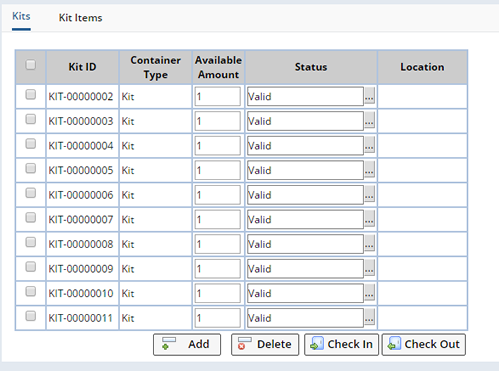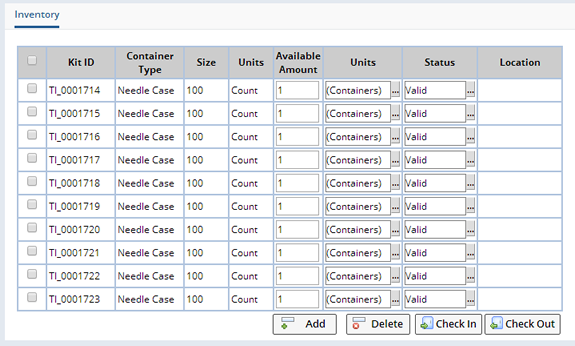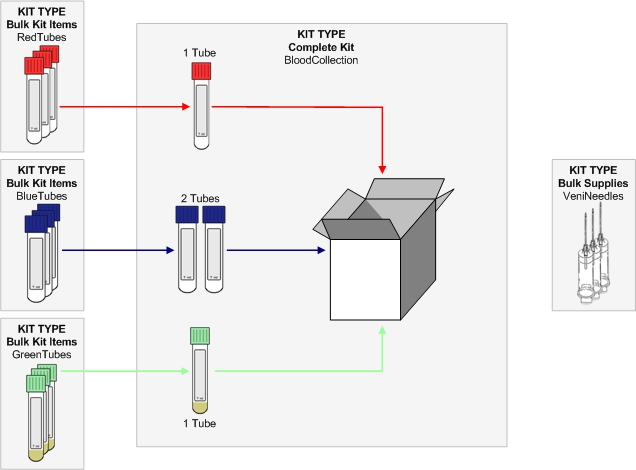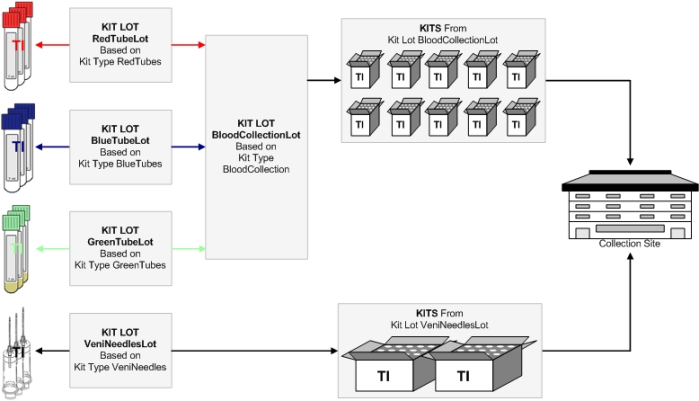This example covers settings required to use Kits
throughout LabVantage. Kit pages also contain some optional features
not demonstrated by these examples. Additionally, there are several
ways you can perform these operations in various orders. These features
and variants serve no purpose in demonstrating Kit flow, and would
result in confusion during a demonstration of overall Kit
functionality. The full details of all the features of Kits are covered
in
these references:
In addition to example data supplied with LabVantage, this
example assumes the following items exist:
| Unit |
One Unit:
When creating this Unit, put it into the "Volume Units" Category. |
| Container
Types |
Three Container types:
|
The example shown here will show how to create blood
collection kits that are assembled with blood collection tubes and
shipped to collection sites. In addition, some supplies for blood
collection, such as venipuncture needles are also shipped in bulk to
collection sites. This is a very typical scenario for the use of Kits,
especially for a protocol driven BioBanking study.
We will create Kit Lots called "BloodCollectionLot" and
"VeniNeedlesLot".
To begin with, we will create three Kit Types for "RedTubes",
"BlueTubes", and "GreenTubes". These define the "Kit Items" for putting
in the Kits that make up the "BloodCollectionLot" Kit
Lot:
| Kit Type
|
Kit Class
|
Quantity
|
From Container Type...
|
| RedTubes |
Bulk Kit Item |
50 Count |
Tube Case |
| BlueTubes |
Bulk Kit Item |
50 Count |
Tube Case |
| GreenTubes |
Bulk Kit Item |
50 Count |
Tube Case |
Next, we will create a fourth Kit Type called
"BloodCollection" to
use as a template for creating the Kit Lot "BloodCollectionLot". This
Kit Type
defines the "Recipe" of the "Kit Items" required for a Kit:
| Kit Type
|
Kit Class
|
Recipe
|
From Container Type...
|
After combining, put
in...
|
| BloodCollection |
Complete
Kit |
1 Tube |
Tube Case |
10 Kits |
| 2 Tubes |
Tube Case |
| 1 Tube |
Tube Case |
Finally, we will create a fifth Kit Type called "VeniNeedles"
to use as a template for creating the Kit Lot "VeniNeedlesLot". This
Kit Type is for bulk supplies that are used directly and not part of
subsequent Kit:
| Kit Type
|
Kit Class
|
Quantity
|
From Container Type...
|
| VeniNeedles |
Bulk Supplies |
100 Count |
Needle Case |
After creating Kit Types, we will create three Kit
Lots for "RedTubeLot", "BlueTubeLot", and "GreenTubeLot". Each will
inherit the content counts
and Container Type defined by its respective Kit Type. Each of
these lots generates a single Trackable Item for the Kit Lot. For these
Kit Lots it is only the inventory amount of the Kit Lot that is tracked
and not the content or location of each individual Container in the Kit
Lot.
Next, we will create a Kit Lot for "VeniNeedlesLot". In this
case a Trackable Item is generated for each Container, inherited from
the Kit Type, in the Kit Lot to enable individual Containers to have
their content and location tracked.
Finally, we will create a fifth Kit Lot for
"BloodCollectionLot".
A Trackable Item is again generated for each Kit Container.
After all Kit Types and Kit Lots are created, you will:
| • |
Ship the Kits to a collection site |
| • |
Receive Kits at a collection site ready for use |
|
|
Add three Kit Types called "RedTubes", "BlueTubes", and
"GreenTubes":
|
| |
|
Open the Kit Type List page (Kits à Kit Types)
and click "Add".
|
| |
|
For each of the three Kit Types, specify only the
information shown in the table below (and nothing else), then Save each:
| NOTE:
|
|
After saving each Kit Type, you can use the
"Add Another" button to add the next one. |
|

| |
RedTubes
|
BlueTubes
|
GreenTubes
|
|
| Kit
Type
|
|
|
|
|
| Kit
Type |
RedTubes |
BlueTubes |
GreenTubes |
User supplied
identifier of the Kit Type. |
| Kit Class |
Bulk Kit Item |
Bulk Kit Item |
Bulk Kit Item |
Classification of the
Kit Type to define how the generated
Kits are used. |
|
|

| |
RedTubes
|
BlueTubes
|
GreenTubes
|
|
| Expected
Amount
|
|
|
|
|
| Expected
Amount |
10 |
10 |
10 |
Number of expected
Kits in a Kit Lot when receiving a Kit Lot of this Kit Type. |
| Expected
Amount Unit |
(Containers) |
(Containers) |
(Containers) |
Units for the Expected
Amount value. |
| Container
Type |
Tube Case |
Tube Case |
Tube Case |
Container Type for the
Kits that will be received. |
| Container Type Size |
50 |
50 |
50 |
Read-only information
describing the Container Type. Populated upon Container Type selection. |
| Container Type Unit |
Count |
Count |
Count |
Read-only information
describing the Container Type. Populated upon Container Type selection. |
|
|
|
|
Add a fourth Kit Type called "BloodCollection":
|
| |
|
Open the Kit Type List page (Kits à Kit Types)
and click "Add".
|
| |
|
Specify only this information (and nothing else):
|

| Kit
Type
|
|
|
| Kit
Type |
BloodCollection |
User supplied
identifier of the Kit Type. |
| Kit
Class |
Complete Kit |
Classification of the
Kit Type to define how the generated
Kits are used. |
|
|
| |
|
Save this, then specify only the following information
(and nothing else):
|

| Kit
Items
|
| Kit Type |
Amount |
|
| RedTubes |
1 |
Quantity of the
specified Kit Type required for assembling a Kit. |
|
| Kit Type |
Amount |
|
| BlueTubes |
2 |
Quantity of the
specified Kit Type required for assembling a Kit. |
|
| Kit Type |
Amount |
|
| GreenTubes |
1 |
Quantity of the
specified Kit Type required for assembling a Kit. |
|
|
|
|
|
Add a fifth Kit Type called "VeniNeedles":
|
| |
|
Open the Kit Type List page (Kits à Kit Types)
and click "Add".
|
| |
|
Specify only this information (and nothing else) and
save:
|

| Kit
Type
|
|
|
| Kit
Type |
VeniNeedles |
User supplied
identifier of the Kit Type. |
| Kit
Class |
Bulk Supplies |
Classification of the
Kit Type to define how the generated
Kits are used. |
|
|

| Expected
Amount
|
|
|
| Expected
Amount |
10 |
Number of expected
Kits in a Kit Lot when receiving a Kit Lot of this Kit Type. |
| Expected
Amount Unit |
(Containers) |
Units for the Expected
Amount value. |
| Container
Type |
Needle Case |
Container Type for the
Kits that will be received. |
| Container Type Size |
100 |
Read-only information
describing the Container Type. Populated upon Container Type selection. |
| Container Type Unit |
Count |
Read-only information
describing the Container Type. Populated upon Container Type selection. |
|
|
|
|
Add three Kit Lots called "RedTubeLot", "BlueTubeLot",
and
"GreenTubeLot":
|
| |
NOTE:
|
|
"Receive Bulk Supplies" is intended for use with Kits
purchased from a vendor.
"Generate Kits" is intended for use with Kits you are
generating. |
| |
|
For each of the three Kit Lots, open
the Receive Bulk Supplies Maintenance page (Kits à
Receive Bulk Supplies), specify the Kit Type
and Description as shown below,
and then Save it:
|

| |
RedTubeLot
|
BlueTubeLot
|
GreenTubeLot
|
|
| Kit
Lot
|
|
|
|
|
| Kit
Type |
RedTubes |
BlueTubes |
GreenTubes |
Identifier of the Kit
Type upon which this Kit
Lot is based. |
| Description |
Red Tube Lot |
Blue Tube Lot |
Green Tube Lot |
Text
description. Initially set to the Description from the
selected Kit Type. |
| NOTE:
|
|
Kit Lot identifiers are automatically
generated.
The Status of the Kit Lot is "Initial". The
Kit
Lot status will change to "Active" after saving. See Kit Status
to view the life cycle. |
|
|
| |
|
Note the inheritance for each (you don't have to enter
anything):
|

The Amounts are
inherited from each Kit Type (RedTubeLot is shown above as an example):
| |
RedTubeLot
|
BlueTubeLot
|
GreenTubeLot
|
|
| Amounts
|
|
|
|
|
| Initial
Amount |
10 |
10 |
10 |
Quantity of the
Kits received in this Kit Lot. |
| Amount
Unit |
(Containers) |
(Containers) |
(Containers) |
Units for the Initial
Amount value. |
| Container
Type |
Tube Case |
Tube Case |
Tube Case |
Container Type for the
Kits that are received. |
| Container Type Size |
50 |
50 |
50 |
Read-only information
describing the Container Type. |
| Container Type Unit |
Count |
Count |
Count |
Read-only information
describing the Container Type. |
|
|
| |
|
Note the "Inventory" tab. The Containers are inherited
from each Kit Type (RedTubeLot is shown below as an example):
|

| |
RedTubeLot
|
BlueTubeLot
|
GreenTubeLot
|
|
| Inventory
|
|
|
|
|
| Kit
ID |
TI generated by
RedTubes Kit Type |
TI generated by
BlueTubes Kit Type |
TI generated by
GreenTubes Kit Type |
Shows the
automatically-generated Track Item ID that has been created to track
the total inventory of the Kit Lot. |
| Container
Type, Size and Units |
Tube Case, 50 Count |
Tube Case, 50 Count |
Tube Case, 50 Count |
Shows the Kit
Container Type and the amount of contents. |
| Available
Amount and Unit |
10 (Containers) |
10 (Containers) |
10 (Containers) |
Shows that each Kit
has a number of trackable (inventory) containers. |
| Status |
Valid
|
Valid |
Valid |
Kit status is "Valid".
See Kit Status
to view the life cycle. |
|
|
|
|
Add a fourth Kit Lot called "BloodCollectionLot".
Specify the
Kit Type and Description:
|
| |
|
Open the Generate Kits Maintenance page (Kit Lots > Generate Kits), specify
the Kit Type and Description and save:
|

| Kit
Lot
|
|
|
| Kit
Type |
BloodCollection |
Identifier of the Kit
Type upon which this Kit
Lot is based. |
| Description |
Blood Collection Lot |
Text description. Initially set to the Description from the
selected Kit Type. |
Amount to Generate
(Amounts tab) |
10 |
Quantity of the Kits
assembled in this Kit Lot. |
| NOTE:
|
|
The Status of the Kit Lot is "Initial".
The Kit
Lot status will change to "Active" after saving. See Kit Status
to view the life cycle. |
|
|
| |
|
Note the information under the Kits tab:
|

| Kits
|
|
|
| Kit
ID |
ID generated by
BloodCollection Kit Type |
Shows the
automatically-generated Kit ID that has been created to track each
Kit. |
| Container
Type |
Kit |
Shows the Kit
Container Type. |
| Available
Amount |
1 |
Shows that each Kit is
in a single trackable container. |
| Status |
Valid |
Kit status is "Valid".
See Kit Status
to view the life cycle. |
|
|
| |
|
Select the Kit Items tab and lookup the Kit Lots to be
used as the inventory for generating this Kit Lot:
|

The Kit Items tab is
automatically populated with rows that list the constituent parts of
this Complete Kit as specified in the Kit Type definition. When Kit
Lots are selected then inventory from the lots are used to generate
the Kits in this Kit Lot.
|
RedTubes
|
BlueTubes
|
GreenTubes
|
|
| Kit
Items
|
|
|
|
|
| Kit
Type |
RedTubes |
BlueTubes |
GreenTubes |
Shows the individual
Kit Types that make up the constituent parts of the Complete Kit. |
| Version |
1 |
1 |
1 |
Shows the version of the Kit Type. |
| Lot |
Selected RedTubes Kit
Lot |
Selected BlueTubes Kit
Lot |
Selected GreenTubes
Kit Lot |
Shows the Kit Lot Id for the selected lot. |
| Kit ID |
TI selected from
RedTubes Kit Lot |
TI selected from
BlueTubes Kit Lot |
TI selected from
GreenTubes Kit Lot |
Shows the Kit ID from the selected lot. |
| Recommended
Amount |
1 |
2 |
1 |
Read-only value of the expected amount of the Kit Type needed for Kits in this Kit Lot. |
| Use
Amount |
1 |
2 |
1 |
Shows the amount to be used of the Kit Type in Kits for this Kit Lot. |
|
|
|
|
Add a fifth Kit Lot called "VeniNeedlesLot".
Specify the
Kit Type and Description:
|
| |
|
Open the Receive Bulk Supplies Maintenance page
(Kits à
Receive Bulk Supplies), specify the Kit Type and Description and save:
|

| Kit
Lot
|
|
|
| Kit
Type |
VeniNeedles |
Identifier of the Kit
Type upon which this Kit
Lot is based. |
| Description |
Venipuncture Needles
Lot |
Text description. Initially set to the Description from the
selected Kit Type. |
| NOTE:
|
|
The Status of the Kit Lot is "Initial".
The Kit
Lot status will change to "Active" after saving. See Kit Status
to view the life cycle. |
|
|
| |
|
Note the inheritance (you don't have to enter anything):
|

The Amounts are
inherited from Kit Type "VeniNeedles":
| Amounts
|
|
|
| Initial
Amount |
10 |
Quantity of the
Kits received in this Kit Lot. |
| Amount
Unit |
(Containers) |
Units for the Initial
Amount value. |
| Container
Type |
Needle Case |
Container Type for the
Kits that are received. |
| Container
Type Size |
100 |
Read-only information
describing the Container Type. |
| Container
Type Unit |
Count |
Read-only information
describing the Container Type. |
|
|
| |
|
Note the information under the Inventory tab:
|

The Amounts are
inherited from Kit Type "VeniNeedles":
| Inventory
|
|
|
| Kit
ID |
ID generated by
VeniNeedles Kit Type |
Shows the
automatically-generated Kit ID that has been created to track each
Kit. |
| Container
Type, Size and Units |
Needle Case, 100 Count |
Shows the Needle Case
Container Type each with 100 needles. |
| Available
Amount and Unit |
1 (Containers) |
Shows that each Kit is
in a single trackable container. |
| Status |
Valid |
Kit status is "Valid".
See Kit Status
to view the life cycle. |
|
|
|
|
Return to the Kit Lots List page to show all
"Active" lots. See Kit Status
to view the life cycle:
|
|
|
|
|
Shipping and Receiving Kits
|
|
|
|
|
|
In this example, a central repository is responsible for
managing
and generating various Kits. These are then shipped out to collection
sites to be used. Shipping of Kits may also be done within the context of
a Study (See Generate
Kits) or Protocol Study Site (See Sites).
A collection site that has access to LabVantage can receive the package
that contains the Kits and manage their storage. Alternatively, for
external collection sites, Proxy
Packages may be used to manage the Kit package. Below the
"BloodCollection" and "VeniNeedle" Kits are shipped to a collection
site.
|
|
Shipping "BloodCollection" and "VeniNeedle" Kits to a
collection site:
|
| |
|
Open the Kit Lots List page (Kits > Kit Lots):
Select all the "BloodCollection" Kits as well as 2 Kits
from the "VeniNeedles" Kit Type
|
| |
|
Click "Create Shipment" to generate Package for shipping
to a collection site:
|
| |
|
Open the Package Maintenance page by clicking the hyperlink in the Package
confirmation window above, or open Package List page (Packages
> Packages) and search for the newly created Package:
Select the Package and click "Edit" to specify the
destination
and other details for the Package. Save the information and return to
the Package List page.
|
| |
|
Select the Package and click "Ship" to ship the Package
to the collection site.
|
|
|
Receiving "BloodCollection" and "VeniNeedle" Kits at a
collection site:
|
|
|
Open the Package List page (Packages > Packages) and search
for the received Package:
Select the Package and click "Receive" to receive the
Package.
|
| |
|
Once the Package is received, click "Unpack" to unpack
the Kits at the collection site and place into storage:
|
|
|
Alternatively you can proxy receive the
"BloodCollection" and "VeniNeedle" Kits
if the collection site does not have access to LabVantage:
|
|
|
Open the Proxy Package List page (Packages > Proxy Packages)
and search for the shipped Package:
|
| |
|
Select the Package and click "Receiver
Info":
Click "Proxy Receive and Empty Package" to receive and
unpack the Package by proxy.
|

